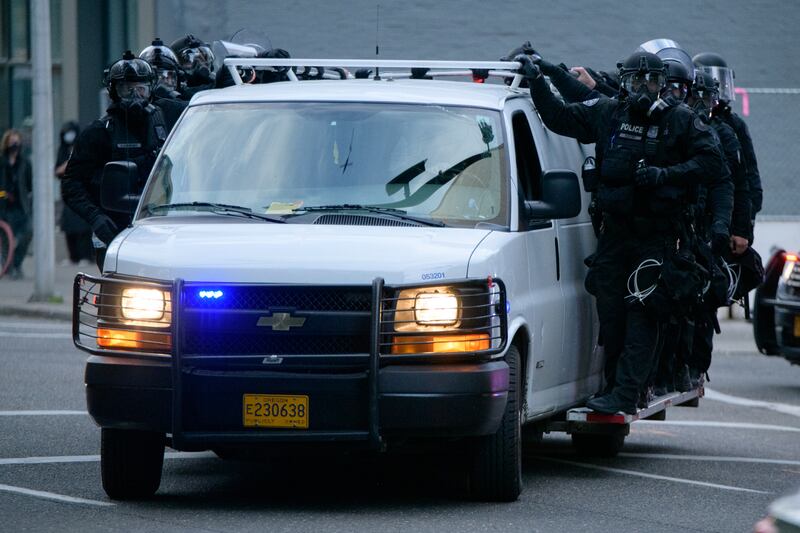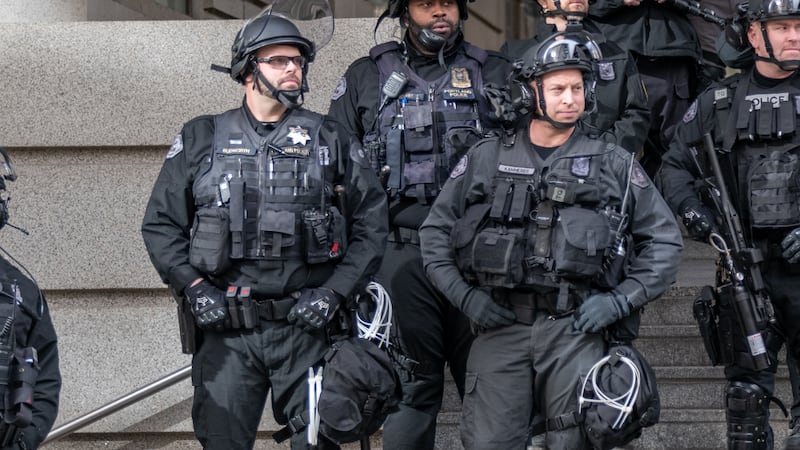The June 15 criminal indictment of Portland Police Officer Corey Budworth arrived as a shock.
Budworth, a six-year-veteran of the Police Bureau, was a member of the unit that for more than 100 consecutive nights last year faced off with racial justice protesters in the streets of Portland. Last week, a grand jury indicted him on one count of assault in the fourth degree for hitting a photographer named Teri Jacobs with a baton during an August 2020 protest.
Part of what made Budworth’s indictment surprising was the familiar, even routine nature of the alleged assault, captured on video—one of hundreds of similar clips recorded on cell phones by journalists, activists and protesters since marches began in the wake of George Floyd’s murder last May.
Cop 37 shoves woman hitting her from behind in the head with baton, then hits her again in the face with baton while she is sitting on the ground pic.twitter.com/t4phwbWpsK
— John #FreePalestine (@Johnnthelefty) August 19, 2020
“It’s not lost on us that this is a bit of an anomaly,” says Juan Chavez, Jacobs’ attorney. “I’ve done enough of these suits and none of them, against police officers at least, have resulted in this kind of a response by the DA, by the [Police] Bureau, by the City Attorney’s Office.”
But behind the scenes, the Portland Police Bureau and Multnomah County District Attorney’s Office have been weighing potential criminal prosecution of riot cops for nearly a year.
WW has learned that PPB initiated investigations for 12 officers on the Rapid Response Team for potential criminal prosecution since last June. So far in 2021, the bureau says it has referred three of those cases to the DA’s office for possible prosecution, plus a fourth PPB officer case that is not RRT-related.
The Police Bureau says it does not know the names of the officers it referred to the DA’s office, which declined to disclose the names to WW.
“Generally, the Multnomah County District Attorney’s Office does not confirm the existence or comment on pending criminal investigations unless and until charges are publicly filed and available for inspection,” said Brent Weisberg, a spokesman for the DA. “Our office continues to investigate and review matters involving members of law enforcement. It would be inappropriate and detrimental to those ongoing investigations to describe the scope of these probes or to release any additional information.”
We know the names of two RRT officers facing potential criminal prosecution: Budworth, and Detective Erik Kammerer, whose case the DA’s office forwarded to the Oregon Department of Justice in November 2020. The bureau continues to investigate about a dozen officers for possible criminal conduct, though it’s not clear if any of them are on the RRT.
Those numbers help to explain why the members of the Rapid Response Team responded to the indictment of Budworth by voting to dissolve the unit on June 16. The gesture threw the city’s response to protests into disarray and exposed a long-simmering resentment from officers on the unit.
In fact, the police union has been complaining for months that the investigations of riot cops are taking too long to complete and leaving officers dangling at the mercy of elected officials.
In an October 2020 memo, Portland Police Association executive director Daryl Turner wrote that he was concerned for the morale of RRT officers, whom he said the city was using as “political pawns in reelection campaigns and party politics.”
Now those officers have quit the assignment. For some longtime police critics, that feels like a victory.
“Clearly the model of policing we have doesn’t work,” Commissioner Jo Ann Hardesty said in a June 18 statement. “The good old boy network is crumbling and we can either be a part of the change or part of the status quo.”
But the pace of change has left many observers with questions. Here are a few answers.

Has the Multnomah County District Attorney’s Office ever pursued charges against Portland police officers before?
Yes. In 2011, a Multnomah County grand jury indicted PPB Officer Dane Reister on two counts of assault in the third and fourth degree for firing at a fleeing suspect with what he believed to be nonlethal beanbag rounds, but were in fact shotgun rounds. He later died by suicide in 2015.
And in October 2020, the Multnomah County DA’s office filed a criminal case against Scott Groshong, later forwarded to the Marion County District Attorney’s Office, listing nine counts—including official misconduct and assault in the third degree—for allegedly driving his police vehicle into a man fleeing a vandalized skateboard shop during a June 15, 2020, protest.
Have criminal investigations of Portland cops increased in the past year?
District Attorney Mike Schmidt has made clear he’s committed to taking up prosecutions of police. “We cannot expect the community to trust law enforcement if we hold ourselves to a lower standard,” he said in a statement last week.
But when it comes to prosecuting police, the DA’s office does not always act in a vacuum.
Deputy Chief Chris Davis said during a June 17 press conference that it is standard practice for the Police Bureau to refer an investigation of an officer to the county prosecutor’s office for review “to make sure that there aren’t any criminal issues before we move forward with an administrative investigation.”
“I would expect the district attorney to act in good faith to address any criminal issues that come up among our members,” Davis said. “And that’s a long-standing expectation.”
Whether the Police Bureau has increased its rate of criminal investigations of officers is hard to pinpoint—especially because the city’s police oversight board, Independent Police Review, received nearly 4,000 complaints or contacts regarding use of force against protesters since last summer.
As a result of those complaints, IPR opened investigations into 86 protest cases involving possible use of force by 43 officers, says KC Jones, policy and outreach coordinator for IPR.
“We’ve never seen this sheer volume before,” Jones says. “We went from a time when it was maybe a Patriot Prayer protest every month, to sustained protests with an RRT response.”
From June to December 2020, the bureau investigated 21 criminal cases. Nine of those cases involved RRT officers, PPB says. The bureau referred 17 of the 21 to the DA’s office, and all of them were later determined not to be criminal.
What do the two officers now facing potential criminal prosecution have in common?
Budworth and Kammerer—prior to June 16—were members of the Rapid Response Team, a 50-member unit most known for its management of protests. RRT members, whose assignment to the team is voluntary, receive specialized training in “crowd psychology and behavior [and] team formations and movements,” according to PPB.
Budworth served on RRT for four years, according to the Portland Police Association.
He has been on administrative leave since June 16, according to PPB spokesman Sgt. Kevin Allen. If convicted of the class A misdemeanor, he faces upward of 364 days in jail and a $6,250 fine.
Kammerer had significantly more experience on the unit, joining in 2001—its inaugural year. He served as leader of RRT’s Delta Squad, according to a July 2020 declaration submitted in federal court, and he previously trained as a “grenadier” for the team, meaning he is certified to launch impact munitions like foam-tipped projectiles and CS gas using a 40 mm launcher.
Kammerer and Budworth both faced civil lawsuits alleging they used excessive force while serving on RRT.
The DA’s office said it learned of Jacobs’ identity after she filed a lawsuit in federal court in September 2020, which initially identified Budworth as “Officer 37” due to his helmet number.
And WW has reported extensively on allegations against Kammerer, including a lawsuit filed last month by a Portland father named Elijah Warren who accuses Kammerer, better known as “Officer 67,” of striking him in the back of the head with his baton last September as Warren spoke to another officer about tear gas seeping into his home.
So why are Rapid Response Team officers so upset about these indictments?
During a June 22 press conference, Mayor Ted Wheeler said Budworth’s indictment wasn’t the exclusive cause of the RRT resignations, but that it may have been “the final straw for them.”
“What I’m hearing from them is, they’re tired, they’re exhausted, they’re stressed,” Wheeler said. “And they don’t feel they have the level of support—either from elected officials or from the community—to be able to do their jobs effectively. And this last issue of indictments weighed heavily on them.”
The major frustrations stem from what police have described as a lack of support from city officials following more than 100 nights of protests beginning last year.
In the October memo, Turner wrote to Wheeler and Portland Police Chief Chuck Lovell that RRT members have had “threats of rape, murder and assaults on their families hurled at them.”
But Turner said officers are also frustrated by “monthslong” investigations into complaints of misconduct.
“And, when they are cleared of allegations, get them back on the team,” Turner wrote. “Employ due process and resolve the complaints against RRT members rather than busting their morale by benching them as the city lethargically conducts its investigations.”
How will this affect the city’s contract negotiations with the police union?
The disbanding of the RRT may also signal the use of last year’s protests as leverage during contract negotiations, no longer occurring in the public view.
On June 14, Turner announced that the PPA had filed for mediation after 150 days of bargaining with the city. As WW first reported, among the topics that will be negotiated behind closed doors are body cameras, which the police union wants and City Hall is unsure about, in part because the union wants near-exclusive access to the footage.
In a June 17 memo to police brass, first reported by The Oregonian, the RRT members specifically mentioned the desire for body cameras, and for the first time explained why they want them: to provide footage of the riot lines from their point of view, to counteract what protesters and journalists film.
“Had members been equipped with body worn cameras,” the memo says, “the community could have viewed events from our perspective, and complaints of misconduct could also be viewed from the perspective of the officer involved.”
On that front, riot cops have allies in City Hall: During Tuesday’s press conference, both Wheeler and Lovell said they support body cameras for officers. Commissioner Mingus Mapps, too, says he is “ready and eager to have the body cam discussion”—although he hasn’t yet made up his mind.
